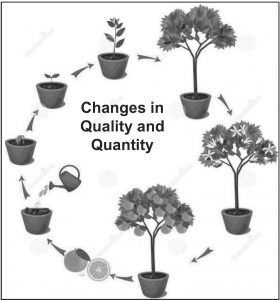
A change where you have more or less of something that can be measured in numbers is a change in quantity. This could be a change in the temperature outside, the score in a game, the size of a political movement, the amount of money in your paycheck—these are all quantitative changes.
If a quantity change is small and sometimes even if it is big, the thing that changes still behaves or can be used in roughly the same way. If the temperature outside goes up or down by a few degrees, it won’t change what you can do very much.
There is another kind of change, however. It usually can’t be measured in numbers, but means changing the way things behave or how we can use them. When the Sun goes down it gets dark. Usually you can’t play sports or do other daytime activities. When you cook raw oats they change into a creamy breakfast food. When workers’ revolution creates communism, capitalism’s misery and limitations will be over and the masses can make their own future.
These are not just changes from more to less or less to more. They are changes in quality.
Quality change alters the internal organization of things, and allows us—or forces us—to deal with them in new ways.
Many sides of communist organizing involve qualitative change. When you decide to talk about communism with friends and make those friendships political, that is a change in quality. If a Red Flag reader begins giving the paper to others, or coming to a study group, those are qualitative changes. Joining the party is a major change in quality. It involves a commitment to work for communist revolution, not just sympathize with it.
A Dialectical Law
Change in quantity and change in quality have a definite relationship. Enough increase or decrease in something will eventually result in a qualitative change. Heat water on the stove for long enough and it will boil.
Bus fares or police murders or unemployment rising far enough, or wages and health care availability falling far enough, will produce qualitative changes, but not just one kind. Some people will join mass protests or finally decide to be done with capitalism. Others might become addicted to drugs or turn to religion. Which qualitative changes will happen depend on a variety of factors, a critical one being the actions of the communist movement.
It is a law of materialist dialectics that enough change in quantity will lead to a change in quality. The reverse is also true. Change in quality can produce a change in quantity. It would be a mistake, however, to think of qualitative changes as things that just happen by themselves or that we can just nudge them a bit this way or that. Often we can decide to make a qualitative change. This is an important fact about organizing for communism.
Opening up an important new area of work can lead to growth. This happened when ICWP began organizing in South Africa. Starting to focus on a particular factory or starting military work can lead to expansion of the party’s influence. Moving from distributing Red Flag outside a workplace to hand-to-hand distribution inside can open up important opportunities for growth. Comrades in some areas are now trying to make a qualitative change in the way we work with friends and new members, counting on people to take more leadership early and learn on the job.
When our work seems to be reaching a limit, we should look for a qualitative changes that we could make that gets beyond that limit. For a long time comrades in San Diego have had a steady distribution of about 100 Red Flags per issue to workers and sailors at Nassco shipyard. Adding more people to our distribution team made little difference. The qualitative change of adding a different shipyard immediately led to a big surge in papers distributed. Now we are trying to add a college campus to our distribution.
San Diego comrades are also looking for closer connections to immigrant rights struggles. Many immigrants there have DACA status, which is due to expire in March. The first worker we talked to at the new shipyard told us that “something’s got to change.” We talked with him about the difference between socialism and communism. If we use dialectics to develop our political work in the right way, the change that happens will be a communist revolution.


